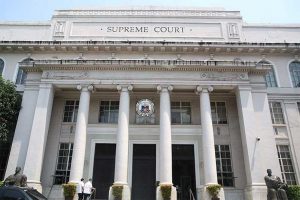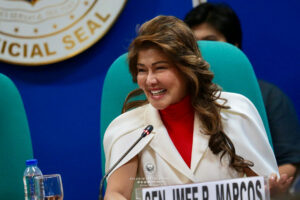Choose competence and courage in May

“The tyranny of some is possible only through the cowardice of others.” — Jose Rizal
The May 2025 Philippine elections are not merely a political exercise. They are a battle for the soul of this nation. For decades, systemic rot has stifled progress, leaving millions trapped in poverty and desperation.
Our country’s most pressing issues are not accidents of fate, but symptoms of systemic failure such as corruption, political dynasties, short-term populism, and environmental neglect. In 2023 alone, the Philippines lost P1.1 trillion to graft, according to Transparency International. These funds could have built 200,000 classrooms, or subsidized healthcare for 30 million families.
A 2023 Philippine Center for Investigative Journalism (PCIJ) study reveals that 73% of congressional seats are held by 178 families, entrenching patronage networks that prioritize clan interests over public welfare. In the Senate alone, we have seen the Estrada/Ejercitos, Cayetanos, Villars, and perhaps soon the Tulfos and Binays*. We witness the proverbial game of thrones between the Marcoses and the Dutertes.
With respect to environmental neglect, for the third straight year, the Philippines has remained the most at-risk country to extreme natural events and negative climate change, according to the 2024 edition of the World Risk Report. And yet, deforestation and unregulated mining persist, led largely by blood-sucking politicians who trade permits for campaign funds or favors.
If we connect the dots, we can see that political dynasties foster patronage, corruption, and overpricing, which divert funds from healthcare, public education, and flood infrastructure, among others. This system perpetuates an impoverished, vulnerable workforce. Environmental disasters cause more poverty, dependence, and short-term populism.
Is the system ultimately rigged to fail?
“When corruption becomes the norm, democracy becomes a myth,” argues senatorial aspirant Francis “Kiko” Pangilinan, author of RA 9227, otherwise known as the Additional Judicial Compensation Act of 2003, among other landmark laws. Senator Kiko happens to be my younger brother, arguably one of the most severely trolled and attacked political opposition candidates on social media. Not surprisingly, corrupt dynasties despise uncompromising leaders of competence and courage.
As the midterm elections near, we voters must confront a stark reality: democracy cannot survive without leaders of courage, competence, and a commitment to the common good. We can have transformative change in a democracy by electing reformist leaders who are willing to dismantle systemic barriers to prioritize structural reforms over hollow, band-aid solutions.
To break the cycle, we voters must reject transactional leaders and instead, elect proven reformers who speak truth and confront power. The leadership imperative is courage over compromise, but the system frowns upon qualified aspirants. A case in point is senatorial aspirant and human rights lawyer Chel Diokno, founding dean of the De La Salle University Tañada-Diokno School of Law, who defended victims of extrajudicial killings despite receiving threats. Another is former Senator Leila de Lima, who was jailed for six years after investigating former President Duterte’s alleged drug war, which eventually led to the strongman’s arrest by the International Criminal Court. Sadly, both Diokno and De Lima backed out of the 2025 senate race, and are instead running as party-list representatives in Congress.
Such leaders of courage, competence, and commitment to the common good exemplify the antidote to systemic decay. They possess the audacity to reject dynastic alliances, prosecute the corrupt, and strengthen the weak — traits that are absent in compromise politicking.
Populist candidates peddle quick fixes: cash aid, fuel subsidies, or ayuda (assistance). They preach a false dichotomy, favoring stability over real change, and “unity over reform.” Their stop-gap non-solutions ignore root causes, and are therefore unsustainable. They say things such as, “Infrastructure will heal our divisions.” But such statements ring hollow when projects like the P23-billion Metro Manila Subway remains delayed by graft. They collapse, just like the new, substandard Cabagan-Sta. Maria Bridge in Isabela.
The Philippine government will go a long way if reformists are supported and elected instead of mocked, trolled, or persecuted. We need leaders who do not fear backlash as they pursue true reforms. These reformists will tie pork barrel funds to anti-corruption benchmarks. Their justice will be swift, but never outside the bounds of law. Billions in “confidential funds” or discretionary budgets will be redirected to build new homes, educate teachers, or finance climate-resilient farms.
The stakes are existential. Climate disasters escalate, poverty worsens, and democratic institutions crumble under dishonest dynasties. Yet, despair is not an option. The 2025 ballot offers a rare chance for us to elect leaders like farmer and fisherfolk advocates, peacebuilders for Mindanao, champions of small entrepreneurs, and patriots whose records prove that courage and competence may coexist.
The May election is not about personalities. Every ballot that is cast for a reformist weakens corrupt dynasties. Every vote against graft rebuilds trust. Every demand for accountability plants seeds of renewal.
May God bless us this May 12 with Filipino voters who will choose courage and competence over complicit silence.
*Current senators Raffy Tulfo and Nancy Binay may soon be joined (in the case of Tulfo) or replaced (in Binay’s case) by siblings in the Senate. — Ed.
Joseph Pangilinan is a professional lecturer at the Department of Management and Organization of the De La Salle University Ramon V. Del Rosario College of Business.




